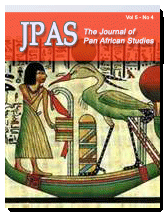ARCHIVE ISSUE
 Volume 5 • Number 4 • 2012
Volume 5 • Number 4 • 2012
On the cover: Bennu bird, a deity of Ra via ancient Kemet (Egypt).
● African-centered Theory and Methodology in Africana Studies: An Introduction
by Sekhmet Ra Em Kht Maat, Guest Editor and Karanja Keita Carroll, Assistant Guest Editor and Associate Editor
[ view PDF ]
● Africana Studies Moving Toward Dereliction, Savaged by Invisible Jim Crow, Warrior-Scholars in Chaos: What to do? Embrace the Irrefragable African-centered Worldview
by Daudi Ajani ya Azibo
[ view PDF ]
A 20-year retrospective essay since the publication of "Articulating the Distinction between Black Studies and the Study of Blacks: The Fundamental Role of Culture and the African-Centered Worldview." Azibo argues that the field of Africana Studies is headed toward dereliction because it has not settled on the African-centered worldview for its conceptual framework.
● Jacob H. Carruthers and the African-Centered Discourse on Knowledge, Worldview, and Power
by Kamau Rashid
[ view PDF ]
This essay seeks to explicate Jacob Carruthers' varied discourse on knowledge, worldview, and power. It offers an analysis of his work as a compelling site of cultural critique and African-Centered knowledge production, which continues to inform our on-going conceptualization of Africana Studies as a liberatory enterprise.
● The Scholarship of Cedric J. Robinson: Methodological Considerations for Africana Studies
by Joshua Myers
[ view PDF ]
This paper examines the scholarship of Cedric Robinson as an exemplar and considers its methodological approaches as plausible alternatives for a distinct approach to Africana Studies. It is an effort not aimed at negating previous conversations, and is purposed on contributing to some of the (re)current themes in the prevailing discourses on Africana Studies methodology.
● African Mythic Science or Vodou Methodology
by Denise Martin
[ view PDF ]
African mythic science or Vodou methodology proposes the approach of applying myth to life by using knowledge archived in African myths to discuss and give meaning to the experiences of African and African descended people. Archetypes, metaphors, patterns, symbols and rituals associated with myth become key points of analysis in the development of the mythic mind, an intellectual perspective valuable for interpreting the African experience mythically and one that is both culturally centered and holistic.
● The Implications of Africa-Centered Conceptions of Time and Space for Quantitative Theorizing: Limitations of Paradigmatically-Bound Philosophical Meta-Assumptions
by Nikitah Okembe-RA Imani
[ view PDF ]
This essay looks at Eurocentric scientific conceptions of time and space, how they effect theorizing concerned with these matters, and how they are altered as one considers non-Eurocentric conceptions.
● Following Their Footsteps: Tracing Puerto Ricans' Sociopolitical Activism in New York City from an Afro-Centric Perspective
by Milagros Denis-Rosario
[ view PDF ]
This paper reviews the life and work of Schomburg and examines his perspective on the central role of Africa and its descendants in the history of the world, giving voice to Afro-descendants' quest to preserve their culture wherever they are. Utilizing the philosophy of C. Tsehloane Keto, who posited the centrality of African history in interpreting the experience of people of African descent in the U.S. and around the world, this essay traces the emergence of Puerto Rican nationalist cultural identity in the city of New York, specifically the extent of Black "Nuyoricans'" articulation of an Afro-centric identity or Black consciousness.
● Ancient Kemet in African American Literature and Criticism, 1853 to the Present
by Christel N. Temple
[ view PDF ]
Though infrequently acknowledged, anteriority informs the development of the African American literary tradition because African American thinkers studied the ancient African record for inspiration as they consciously instigated Africana creative production since the nineteenth century. It is a limited contemporary notion to credit Afrocentricity, alone, for featuring the record of Ancient Kemetic achievement as a catalyst for advancing African agency. Based on this legacy, Afrocentric literary criticism advances a corrective that includes the early history and adds new applications of African-centered cosmology to African American literary analysis.
● Benefits of Afrocentricity in Exploring Social Phenomena: Understanding Afrocentricity as a Social Science Methodology
by Marquita Pellerin
[ view PDF ]
This essay details the components of Afrocentricity as the structural methodology that engenders a culturally appropriate conceptualization of Africana reality. As a methodological framework, Afrocentricity serves as a governing tool of active agency, which informs new approaches in interpreting social phenomenon and can aid in the redevelopment of social science research.
● African-centered Economics and Africana Studies: Theory, Methodology and Curriculum Development
by Justin Gammage
[ view PDF ]
This essay critically examines the collaborative efforts of African-centered Economists and Africana Studies scholars to establish and incorporate African American economics within the Africana Studies curriculum. The central purpose of this research is to offer an alternative method of interpreting Black economics and highlight existing models that worked well at addressing the crux of African American economic development.
● The Intellectual Warfare of Dr. Jacob H. Carruthers and the Battle for Ancient Nubia as a Foundational Paradigm in Africana Studies: Thoughts and Reflections
by Josef Ben Levi
[ view PDF ]
This retrospective essay provides a call to arms for those African-Centered scholars who are seriously engaged in the work of African liberation as intellectual warriors.



